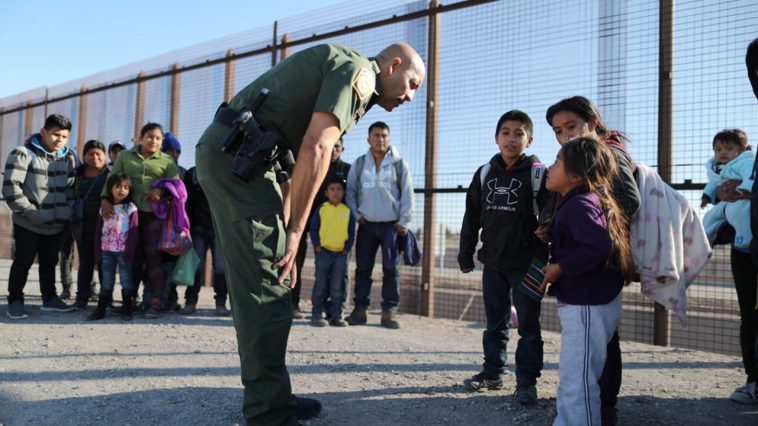LISTEN HERE:
An honorable council member from Naperville, Illinois—an upscale suburb a mere 45-minute drive from Chicago—recently put forth a unique proposal. He suggested that local inhabitants of the wealthy residential community could open their homes to immigrants. This comes amidst ongoing strife relating to the influx of migrants into the United States via the US-Mexico border. Given the frequent reports of Chicago being oversaturated with undocumented immigrants, Councilman Josh McBroom brought forward an idea of human compassion.
During a recent city council gathering, McBroom put out a call to action for the residents of Naperville. He spoke of empathy and individual agency over public funding, urging eager citizens to take a proactive role in this issue. ‘The belief that individuals should take ownership of the situation instead of using taxpayer dollars is something I stand by, as we are part of an empathetic society,’ McBroom communicated to other members of the council.
McBroom’s alternative solution for dealing with the migrant situation focuses on engagement from within the community. ‘Let’s determine who’s willing to contribute’, the city official proposed. He broached the subject with an openness that invited further discussion and called for an examination of various viewpoints from all sides of the community spectrum.
In Naperville, a diverse pool of perspectives was brought to the table. There were supporters seeking proactive solutions alongside skeptics questioning the enforcement of immigration policies. McBroom noted, ‘We frequently engage with constituents of varying opinions on this matter. It behooves us to explore a productive resolution that acknowledges both viewpoints’.
McBroom further highlighted the affluent lifestyle of many Naperville residents, noting the capacity in their large homes to host migrants—temporary or otherwise. He reminded those at the meeting of proposals from other cities across the nation and expressed his hope that Naperville could make a similar gesture. ‘It’s worth investigating who in the community might be prepared to open their homes to migrant families,’ noted McBroom.
The Councilman’s proactive stance on the matter extended to his proposal to design a sign-up sheet to find individuals willing to provide shelter to migrants. McBroom was confident that good Samaritans within their community would come forward to support this initiative.
The councilman’s comments stood as a testament to the belief in community-driven solutions. He acknowledged, ‘If there are residents willing to provide shelter to these families, it’s a commendable act’. His goal was to raise awareness, generate conversation, and present a humane approach to the issue of migration.
McBroom suggested further exploration of community involvement, focusing on the potential positive impact. ‘It’s worth finding out who would be willing to house migrant families. That will contribute to the next phase of our discussion,’ he said. He additionally welcomed further support and open-ended dialogue on his proposal.
The context of this dialog comes from the abundance of migrants—and the challenges they represent—facing the nearby city of Chicago and the surrounding region. Mayor Brandon Johnson has pointed at the actions of Gov. Greg Abbott of Texas, alleging that the issue has been escalated due to political maneuvering.
In a recent interview with MSNBC, Johnson aired his grievances with Abbott, accusing him of targeting democratically-led cities with diverse leadership. He used strong words to denounce what he sees as an unfair and damaging strategy, invoking questions of racial bias and partisan politics.
With hundreds of thousands of migrants traversing the southern border on a monthly basis, the pressure it creates is felt far beyond the border towns. Metropolitan areas, like Chicago, are also directly affected, and likewise feel the impact. Naturally, this has created tension and debate regarding the best approach to handle this situation.
Reports have emerged depicting various Democratic-led regions resorting to unconventional venues to accommodate the incoming migrants. Among them are hotels, schools, and even stadiums being repurposed to provide necessary shelter. This shows the level of urgency and the impact on these communities, as well as the scramble to find workable solutions.
Given these conditions, and possibly drawing lessons from other areas, it seems likely that suggestions like McBroom’s may gain traction. As the situation continues to evolve, emerging proposals for community-driven resolutions like those in Naperville may become more widespread.
McBroom’s proposition is a microcosm of an ongoing national conversation. It represents an option worth considering, emphasizing community involvement and individual sacrifice to support those in need. It serves as a reminder that in times of difficulty, our greatest resource may indeed be the strength of our community.
While the proposed course of action may not work for all communities, it encourages dialogue around possible solutions. McBroom’s call to action underscores the potential of empathetic and affluent communities like Naperville to make a difference in addressing a collective national issue—something that resonates powerfully in our quest to uphold our shared values of compassion and humanity.


